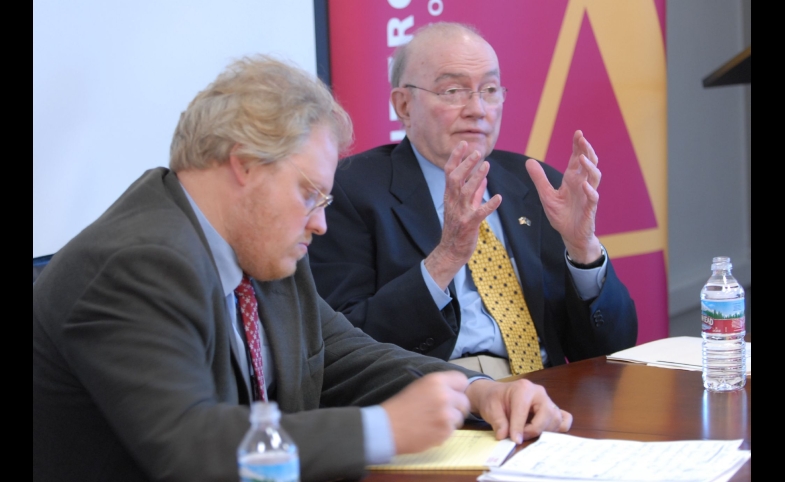The CPD Blog is intended to stimulate dialog among scholars and practitioners from around the world in the public diplomacy sphere. The opinions represented here are the authors' own and do not necessarily reflect CPD's views. For blogger guidelines, click here.

A Remembrance of David M. Abshire (1926-2014)
There is a romantic streak in humanity that drives us to seek out stories of single individuals who make a difference in the impersonal grinding of the wheels of history. This is especially true in the case of wars. Ancients loved stories like that of Horatius saving Rome by steadfastly defending a bridge over the Tiber around 500 BCE, while scholars of America’s Civil War point to Joshua Lawrence Chamberlain of the 20th Maine regiment who turned the tide of battle and arguably the war by holding the hill Little Round Top on the second day of the Battle of Gettysburg. The Cold War has very few such figures, but one man with a good claim to being this kind of the lynch pin – David Abshire (1926-2014) – died last week. Abshire is best remembered as the co-founder of one of the most storied of Washington think-tanks, the Centre for Strategic and International Studies (CSIS), and as President Reagan’s point-man during the Iran-Contra scandal. His service to the Cold War effort was two-fold: in international broadcasting and at NATO.
Abshire’s first essential contribution came in the Nixon period. In 1972 the U.S. Cold War communication effort was in trouble. A few years previously Ramparts magazine had revealed that the CIA was covertly funding Radio Free Europe and Radio Liberty: two important elements in the struggle to get news and dissident views into the Eastern bloc. In 1972, Senator Fulbright led a bid to close these radio stations as they had become ‘relics’ in the era of detente. Then David Abshire, as Assistant Secretary of State for Congressional Relations, hit on the idea of setting up a bi-partisan Board for International Broadcasting to administer the radios with a Congressional grant. He persuaded Senator Mike Mansfield to back the idea and the radios were saved. Abshire later chaired this board and helped develop the radios into an essential political lifeline for Eastern European reform in the later 1970s and 1980s. The radios remain a valuable part of U.S. public diplomacy in some of the most difficult places.
Abshire’s second ‘Little Round Top’ moment was his service as U.S. ambassador to NATO from 1983 to 87. He arrived at a time when the Soviet Union had seized a dramatic advantage in the arms race by deploying a new category of intermediate range missiles capable of being launched from mobile trucks and therefore immune from a first strike. NATO members wanted to deploy a similar cruise missile system – Pershing II – to force the Soviets back to the negotiating table, but knew that they faced stiff opposition from European public opinion. Abshire worked closely with the United States Information Agency and the communicators of member states to push back against anti-nuclear feeling. The great insight of the campaign was to understand that the message was best delivered by experts from within the target countries and not by an American. Abshire’s network of journalists and other defense experts developed at CSIS and the credibility which he had in their eyes proved vital resources. The campaign worked sufficiently well to allow a deployment of Pershing II missiles. The Soviets returned to the table and conceded the abolition of the entire category of intermediate nuclear weapons. It was a text-book case of what a skilled public diplomat working with a network could achieve. His achievement was recognized with the Distinguished Public Service Medal.
In his later years, Abshire organized the Center for the Study of the Presidency. He was a voice for better U.S. public diplomacy and a supporter of a number of public diplomacy projects including American Media Abroad and our own USC Center on Public Diplomacy, which he visited twice in its early days. American public life is less for his passing.
Visit CPD's Online Library
Explore CPD's vast online database featuring the latest books, articles, speeches and information on international organizations dedicated to public diplomacy.
POPULAR ARTICLES
-
January 29
-
January 20
-
January 28
-
February 6
-
January 8
Join the Conversation
Interested in contributing to the CPD Blog? We welcome your posts. Read our guidelines and find out how you can submit blogs and photo essays >.









